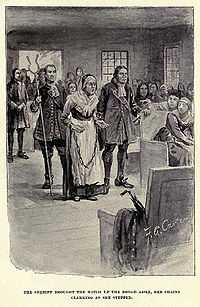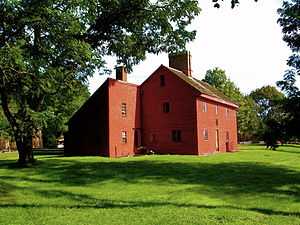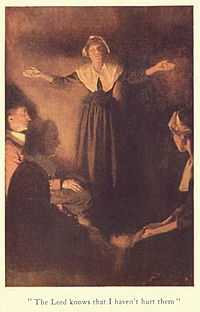Rebecca Nurse

Rebecca Towne Nurse (or Nourse) (February 21, 1621 – July 19, 1692) was executed for witchcraft by the government of the Province of Massachusetts Bay in New England in 1692, during the Salem witch trials. She was the wife of Francis Nurse, with several children and grandchildren, and a well-respected member of the community. Although there was no credible evidence against her, she was hanged as a witch on July 19, 1692. This occurred during a time when the Massachusetts colony was seized with hysteria over witchcraft and the supposed presence of Satan within the colony. Her sisters Mary Eastey and Sarah Cloyce were also accused of witchcraft, with Mary found guilty and executed.
Early life
The daughter of William and Joanna Towne (née Blessing), Nurse was born in Great Yarmouth, England in 1621. Her family settled in Salem Village, which is now known as Danvers, Massachusetts, in 1640. She had three sisters, Susan (baptized 26 Oct 1625 – died 29 Jul 1630), Mary Eastey (baptized 24 Aug 1634) and Sarah Cloyce, and three brothers, Edmund (baptized Jun 1628), Jacob (baptized 11 Mar 1631/32) and Joseph (born abt 1639).
Around 1644, she married Francis Nurse who was also born in England. Her husband was a "tray maker" by trade, who likely made many other wooden household items. Due to the rarity of such household goods, artisans of that medium were esteemed. Nurse and her family lived on a vast homestead which was part of a 300-acre (1.2 km2) grant given to Townsend Bishop in 1636. Francis originally rented it and then gradually paid it off throughout his lifetime. Together, the couple bore eight children: four daughters and four sons. Their names were Rebecca Nurse (born 1642), Sarah Nurse (born 1644), John Nurse (born 1645), Samuel Nurse (born 1649), Mary Nurse (1653 - June 28, 1749), Elizabeth Nurse (born 1656), Francis Nurse (born 1660/1661), and Benjamin Nurse (born in 1665/1666). Nurse frequently attended church and her family was well respected in Salem Village; Francis was often asked to be an unofficial judge to help settle matters around the village. In 1672, Francis served as Salem's Constable. It was later written that Rebecca had "acquired a reputation for exemplary piety that was virtually unchallenged in the community," making her one of the "unlikely" persons to be accused of witchcraft.
Accusation and trial
The Nurse family had been involved in a number of acrimonious land disputes with the Putnam family. On March 23, 1692, a warrant was issued for her arrest based upon accusations made by Edward and John Putnam. Upon hearing of the accusations the frail 71-year-old Nurse, often described as an invalid, said, "I am innocent as the child unborn, but surely, what sin hath God found out in me unrepented of, that He should lay such an affliction on me in my old age."
There was a public outcry over the accusations made against her, as she was considered to be of very pious character. Thirty-nine of the most prominent members of the community signed a petition on Nurse's behalf.[1] At age 71, she was one of the oldest accused. Her ordeal is often credited as the impetus for a shift in the town's opinion about the purpose of the witch trials.
Her trial began on June 30, 1692. In accordance with the procedures at the time, Mrs. Nurse, like others accused of witchcraft, represented herself since she was not allowed to have a lawyer represent her. By dint of her respectability, many members of the community testified on her behalf including her family members. However the young Ann Putnam Jr. and the other children would break into fits and claim Nurse was tormenting them.[2] Such so-called "spectral evidence" was allowed into the trial to show that Satan was afflicting others in the community at the behest of the accused. In response to their outbursts Nurse stated, "I have got nobody to look to but God."[3] Many of the other afflicted girls were hesitant to accuse Nurse.
In the end, the jury ruled Nurse not guilty. Due to public outcry and renewed fits and spasms by the girls, the jury asked the magistrate that the verdict be reconsidered. The jury changed their verdict, sentencing Nurse to death on July 19, 1692.
Death and aftermath

Many people labeled Nurse "the woman of self-dignity", due to her dignified behavior on the gallows. As was the custom, after Rebecca Nurse was hanged, her body was buried in a shallow grave near the gallows along with other convicted witches, who were considered unfit for a Christian burial. Nurse's family secretly returned after dark and dug up her body, which they interred properly on their family homestead. In July 1885, her descendants erected a tall granite memorial over her grave in what is now called the Rebecca Nurse Homestead cemetery in Danvers (formerly Salem Village), Massachusetts.[4] The inscription on the monument reads:
Rebecca Nurse, Yarmouth, England 1621. Salem, Mass., 1692.
O Christian Martyr who for Truth could die
When all about thee owned the hideous lie!
The world redeemed from Superstition's sway
Is breathing freer for thy sake today.
(From the poem "Christian Martyr," by John Greenleaf Whittier)
In 1892 a second monument was erected nearby recognizing the 40 neighbors, led by Israel and Elizabeth (Hathorne) Porter, who took the risk of publicly supporting Nurse by signing a petition to the court in 1692. One signer was General Israel Putnam's father.
Her accuser, Ann Putnam, Jr., publicly apologized to the Nurse family for accusing innocent people. In 1711, the government compensated the Nurse family for Rebecca's wrongful death. The Nurse family homestead fell into the hands of Putnam family descendant Phineas Putnam in 1784. The Putnam family maintained control of the property until 1908. Today, it is a tourist attraction that includes the original house and cemetery, on 27 of the original 300 acres (1.2 km2).
In popular culture

Rebecca Nurse is a central character in Arthur Miller's play The Crucible as well as many other dramatic treatments of the Salem Witch Trials. The PBS film Three Sovereigns For Sarah features Vanessa Redgrave as one of Rebecca Nurse's sisters, Sarah Cloyce, who, although accused, escaped execution. (However, another of Nurse's sisters, Mary Eastey, was also executed.) The film depicts Nurse and her family members as main characters.
Nurse's trial is also the focus of an episode of the CBS radio program "CBS Is There," which aired on July 28, 1947.
She was portrayed by actress Shirley MacLaine in the 2002 CBS miniseries "Salem Witch Trials". In the 1957 and 1996 film adaptations of Miller's play, she was depicted by Marguerite Coutan-Lambert and Elizabeth Lawrence, respectively.
Rebecca Nurse was also the subject of Lectures on Witchcraft by Charles W. Upham.
She is also mentioned in passing in Robin Cook's novel Acceptable Risk, where a fictional character believes her to be pious and registers surprise when she is seen on her way to her execution.
References
- ↑ "Petitions relating to the trial of Rebecca Nurse for witchcraft". Retrieved Mar 8, 2013.
- ↑ The Salem witchcraft papers, original volumes edited by Paul Boyer and Stephen Nissenbaum (1977) / revised, corrected, and augmented by Benjamin C. Ray and Tara S. Wood (2010).
- ↑ "Salem Witch Trials: Court Examination of Rebecca Nurse". Retrieved Mar 8, 2013.
- ↑ "Find-a-Grave: Rebecca Towne Nurse". Retrieved Mar 8, 2013.
Further reading
Upham, Charles (1980). Salem Witchcraft. New York: Frederick Ungar Publishing Co., 2 vv., v. 1 p. 80, v. 2 pp. 56–71, 111, 136, 268, 270-89, 290, 292, 480, 483.
External links
| Wikisource has the text of a 1900 Appletons' Cyclopædia of American Biography article about Rebecca Nurse. |
- Descendants of William Towne
- Salem Witch Trials- Rebecca Nurse
- Mayflower Families
- Rebecca Nurse Homestead
- The Towne Family Association
| ||||||||||||||||||||||||||||||||||||||||||||||||||||||
|